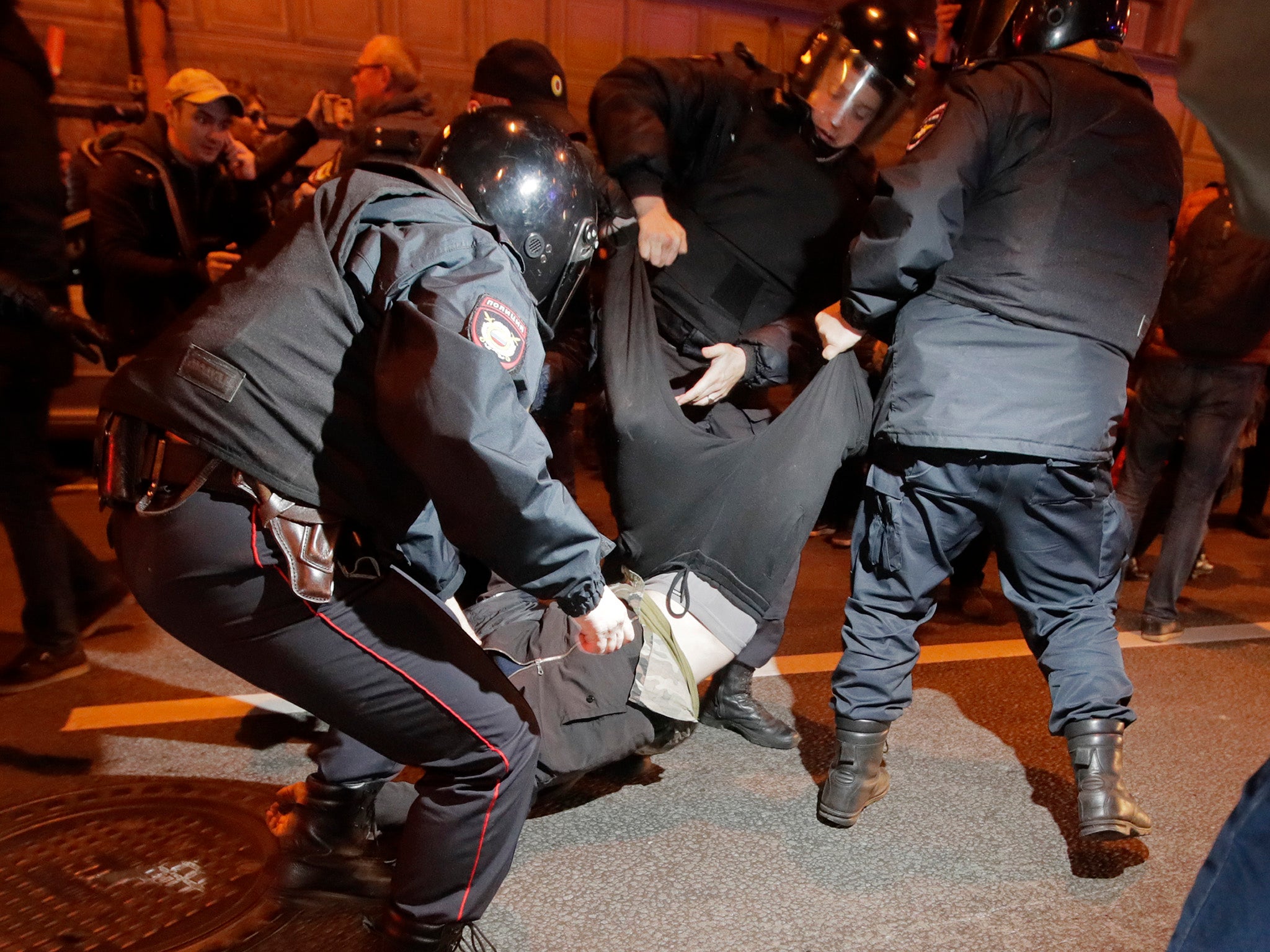Putin birthday protest: Violent arrests as protesters take to the streets in numerous Russian cities
Demonstrators call for campaigner Alexei Navalny to be allowed to stand in elections

Your support helps us to tell the story
From reproductive rights to climate change to Big Tech, The Independent is on the ground when the story is developing. Whether it's investigating the financials of Elon Musk's pro-Trump PAC or producing our latest documentary, 'The A Word', which shines a light on the American women fighting for reproductive rights, we know how important it is to parse out the facts from the messaging.
At such a critical moment in US history, we need reporters on the ground. Your donation allows us to keep sending journalists to speak to both sides of the story.
The Independent is trusted by Americans across the entire political spectrum. And unlike many other quality news outlets, we choose not to lock Americans out of our reporting and analysis with paywalls. We believe quality journalism should be available to everyone, paid for by those who can afford it.
Your support makes all the difference.Russian police went face to face with anti-government protesters in rallies timed to coincide with President Vladimir Putin’s 65th birthday. Hundreds were detained in cities across the country, with violent arrests witnessed in the president’s home town of St Petersburg.
The rallies were an unwanted birthday gift from Mr Putin’s leading critic, Alexei Navalny. In the most part, they were unsanctioned, meaning participants faced arrest for turning up. Mr Navalny, jailed for 20 days earlier this week, had hoped for a large turnout to push for his release and currently unlikely participation in next Spring’s presidential elections.
Heavy police presence, and warnings about the likelihood of arrests seem to have put paid to those hopes. The protests were attended by hundreds, rather than the thousands seen in actions earlier this year.
In Moscow, police estimates of 700 seemed close to the real numbers. A similar number attended the St Petersburg rally. In other cities, the numbers were even less impressive.
The Moscow rally was made up of all colours, old and young — many very young. Liberal and leftists also attended, both the dedicated and simply interested. The crowds had barely gathered on the city’s central Pushkin Square when the police megaphones began working.
“Don’t stay, move away, don’t get in citizen’s way,” went their mantra. The tone was initially polite, but before long, the words "don't let citizens get in our way" were howled out.
“Does that make us non-citizens?” some protesters asked in reply.
Otherwise, the policing was, by Russian standards, low-key. Officers seemed content with allowing the most dedicated core of 200 or so — mostly late teens — to do their thing. Lacking central co-ordination, that group first decided to march down along the main Tverskaya street from Pushkin Square, towards the Kremlin, before debating among themselves, and turning back to the square.
Later in the afternoon, as news of riot police moving in formations started filtering through, Mr Navalny’s Moscow team decided to call an end to the-the rally. Not all of his young supporters agreed however. Many gathered on Manezhnaya Square, near the Kremlin, with the intention of staying until the morning.
But if the Moscow protest went off fairly peacefully, with only two arrests reported, the same could not be said of the other main event. In President Putin’s home city of St Petersburg, several dozen arrests were recorded, and some of them violent.
The protests began on the Field of Mars square, in the west of the city centre in the early evening. Later the protests moved from the original location to the Liteiny Prospekt, a central throroughfare.
Witnesses told The Independent that protesters then took up part of the road, and were intercepted by riot police, and taken away in police vans. Among the arrested was Ildar Dadin, the first to have been imprisoned under Russia’s controversial “persistent protest” laws (he was later pardoned.) One woman received head injuries during arrest.
In the days leading up to the event, authorities had warned of a robust approach to “unsanctioned” protest in the city. Earlier this week, state media news agency TASS carried an article stating police had been given instructions to “respond harshly.”
Local media Fontanka.ru also reported police had booked 20 buses to arrive near the protest site, with the assumption being that they would be used for arrests.
As of 9 pm local time, a total of 271 arrests nationwide had been reported to the independent police watchdog OVD-Info. The most had been made in St Petersburg (62), followed by 57 in Yaroslavl, 21 in Krasnodar and 20 in Lipetsk.
Staff at the watchdog’s ad-hoc call-centre in central Moscow said that the day had been less busy than they had expected. In the last two nationwide rallies, OVD-Info registered approximately 3,600 detentions, creating a caseload of 400 for the team’s 25 lawyers.
“I’ve been working here for six years, and I can tell you there’s no logic to it,” the watchdog’s co-founder Grigory Okhotin told the Independent. “It’s always a political decision from above. It’s impossible to guess the number of arrests, and it’s wonderful if numbers are less than first feared.”
Navalny’s team claimed the nationwide day of protests had been a success. But the low attendance is likely to have dampened the mood of all but his fiercest supporters.
“It was the classic case of an unprepared meeting,” said former Kremlin advisor Gleb Pavlovsky, speaking on the liberal TV Rain channel. “Navalny has clearly got a lot of thinking to do, but then again he’ll have the time to do that in jail.”
Join our commenting forum
Join thought-provoking conversations, follow other Independent readers and see their replies
Comments